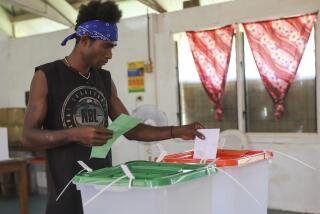Hawaiians to Elect Sovereignty Delegates
- Share via
HONOLULU — Imprisoned in her palace bedroom, Queen Lili’uokalani was given an ultimatum in 1895: Abdicate the throne or her followers would face a firing squad.
“For myself, I would have chosen death rather than to have signed it,” the eighth Hawaiian monarch later wrote. But she felt she had no choice. Her signature forever relinquished the monarchy begun in 1810 by Kamehameha I.
Now, more than a century later, some native Hawaiians want the crown restored, others want their own nation and still others would like to see something akin to the partial autonomy some Indian tribes have, a “nation within a nation,” for descendants of the original islanders.
No one seriously worries about insurrection, but the sovereignty movement in Hawaii is real, and native Hawaiians cast votes this weekend to select the people who will shape it.
“Sovereignty is a trail Hawaiians have been traveling actively for 25 years and even longer since the overthrow of the monarchy,” said Kaipo Kincaid, executive director of Ha Hawaii, sponsor of the election. “This is a journey we are taking--all of us.”
About 100,000 native Hawaiians--anyone with at least part ancestry of the Hawaiian race, no matter where they live--are eligible to elect delegates to a sovereignty convention planned for this summer. The convention, organizers hope, will set specific goals for the sovereignty movement.
The process began three years ago when the Hawaiian Sovereignty Elections Council mailed ballots to 81,507 registered native Hawaiians. Fewer than half voted, but 73% of those who returned ballots favored electing delegates to a convention.
A total of 156 Hawaiians are competing for 85 seats at the convention. Results of the vote are to be announced Jan. 27.
Not all native Hawaiians support the push for sovereignty. Some question the legitimacy of a process begun by less than half of qualified voters.
Kina’u Boyd Kamali’i, a former trustee of the Office of Hawaiian Affairs, an agency charged with looking out for the interests of native Hawaiians, said the election should meet minimum requirements, including having ballots cast by a majority of registered native Hawaiian voters.
Ha Hawaii (“ha” means “breath” in Hawaiian) succeeded the state-appointed Sovereignty Elections Council--and Kamali’i said any process started by state appointees is tainted.
“The Ha Hawaii process is not the breath of life, but possibly the kiss of death to native Hawaiian self-government,” Kamali’i said in a January newsletter from the Office of Hawaiian Affairs.
She also likened the election to the creation of the Republic of Hawaii after Lili’uokalani’s overthrow.
“Then, as now, a small group of unelected individuals decided the process and drafted a constitution--ready or not, wanted or not.”
But Ha Hawaii president Pua’ala McElhaney said the group’s authority comes from its membership and supporting organizations.
“Can detractors have such total lack of trust in the judgment of the Hawaiian people to think that all of these groups, all of these people, as diverse as they are, are under state control and not know it?” McElhaney asked.
Sentiment in favor of sovereignty has existed ever since Americans, Germans and Britons sacked Queen Lili’uokalani’s government and formed the Republic of Hawaii in 1893. She abdicated two years later, having spent a portion of that time under house arrest in her palace.
Sugar planters then persuaded the United States to annex Hawaii in 1898, despite opposition from native islanders.
The islands became a U.S. territory in 1900. Though Hawaiians were U.S. citizens, they could not vote and were represented by a congressional delegate who also could not vote. Hawaii became the 50th state in 1959.
Ha Hawaii still needs to raise about $3 million to hold the convention. Assuming fund-raising targets are met, delegates will likely hold community briefings and then make recommendations for ratification by voters, Kincaid said.
“Over time, the [sovereignty] discussion will weave a fabric,” she said. “As there is more dialogue, the predominant concepts will prevail.”
More to Read
Sign up for Essential California
The most important California stories and recommendations in your inbox every morning.
You may occasionally receive promotional content from the Los Angeles Times.













